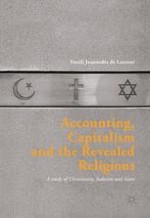2017 | OriginalPaper | Buchkapitel
2. The Book and the Spirits of Capitalism
verfasst von : Vassili Joannidès de Lautour
Erschienen in: Accounting, Capitalism and the Revealed Religions
Aktivieren Sie unsere intelligente Suche, um passende Fachinhalte oder Patente zu finden.
Wählen Sie Textabschnitte aus um mit Künstlicher Intelligenz passenden Patente zu finden. powered by
Markieren Sie Textabschnitte, um KI-gestützt weitere passende Inhalte zu finden. powered by
